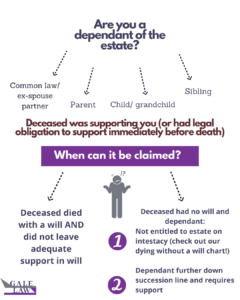Financially Supported By Deceased
A dependant is a parent, child, spouse or sibling of the deceased, to whom the deceased had been providing support (financially, physically/moral support) immediately before their death or was legally bound (e.g., child support) to provide support, as per Part 5 of the Succession Law Reform Act (SLRA).
In order to qualify as a dependent of the deceased’s estate, you must meet the criteria outlined in the flowchart below.

Married spouses hold the right to inheritance when the deceased spouse passes.
There are three possible ways in which a surviving spouse may receive a portion of their deceased spouse’s estate:
- If the deceased spouse has no will, the surviving spouse will inherit through the rules of intestacy. A married spouse would receive what is known as a “preferential share”- an amount that the surviving spouse is entitled to under the rules of intestacy. The current amount set in legislation as the preferential share for those who had passed after March 1st, 2021 is $350,000, plus a percentage of the remainder of the estate depending upon how many other beneficiaries (e.g. children) the deceased may have.
- Alternatively, the surviving spouses can elect to receive an equalization payment instead of the preferential share, pursuant to the Family Law Act (FLA). An equalization payment entitles the surviving spouse to receive half of any positive difference between the value of the net family property they shared with the deceased spouses, as per s.5 of the FLA. Surviving spouses hold the right to choose whether they would like to receive a preferential share by the rules of intestacy or an equalization payment under the FLA.
- If the deceased spouse left a will, the surviving spouse would receive whatever has been indicated to be given to them in the will.
What Happens if What I Inherit is not Adequate to Support Me?
Courts recognize that a deceased holds a moral obligation for the needs of dependents, including spouses.
When someone makes a claim (goes to court to seek relief) for support (money) as a dependent, it is a claim for support in addition to what they may receive per the will or rules of intestacy.
The dependent would file a Notice of Application for the process to commence. In the application, it is important that the applicant refers to the factors set out in s.62 of the Succession Law Reform Act that the Court will consider in their decision:
- Age, physical, and mental health;
- Accustomed standard of living;
- Duration and proximity of relationship;
- Ability to provide own support;
- Size of estate;
- Contributions made to the deceased;
- Contribution of chores and household duties, etc.
Common-Law Spouse Support and Relief
Common-law spouses do not have the same rights as married partners. If you are a common-law spouse, you may have a claim to the estate as a dependent.
First you need to meet the definition of a spouse, which is if you:
- Lived with the deceased for a period not less than 3 years continuously; or
- Had a relationship of permanence (legally meaningful) if you share a child, whether adopted or natural.
Then you need to meet the definition of dependent:
A dependent is a a parent, child, spouse or sibling of the deceased, to whom the deceased had been providing support (financially, physically/moral support) immediately before their death or was legally bound (e.g., child support) to provide support, as per Part 5 of the Succession Law Reform Act (SLRA).
Children, parents, grandparents, grandchildren and a person who is incapable may also meet the test as a dependent.
What Happens if I Have a Separated Spouse?
As of January 1, 2022, legislation (law) has changed to reflect that separated spouses have no property rights (meaning no right to share in the deceased’s estate).
If a death occurs after December 31st, 2021 and the spouses have been separated for longer than 3 years, then they are seen equal to a divorced couple. This means that they do not receive a preferential share (entitlement to be received on an intestacy – when there is no will) and they are not first in line to serve as the estate trustee.
Procedure for a Claim
Courts recognize that a deceased holds a moral obligation for the needs of dependents, including spouses, child, parents, and disabled individuals.
When someone makes a claim (goes to court to seek relief) for support (money) as a dependent, it is a claim for support in addition to what they may receive per the will or rules of intestacy.
The dependent would file a Notice of Application for their Dependent Support Claim. In the application, it is important that the applicant refers to the factors set out in s.62 of the Succession of Law Reform Act that the Court will consider in their decision:
- Age, physical, and mental health;
- Accustomed standard of living;
- Duration and proximity of relationship;
- Ability to provide own support;
- Size of estate;
- Contributions made to the deceased;
- Contribution of chores and household duties, etc.
